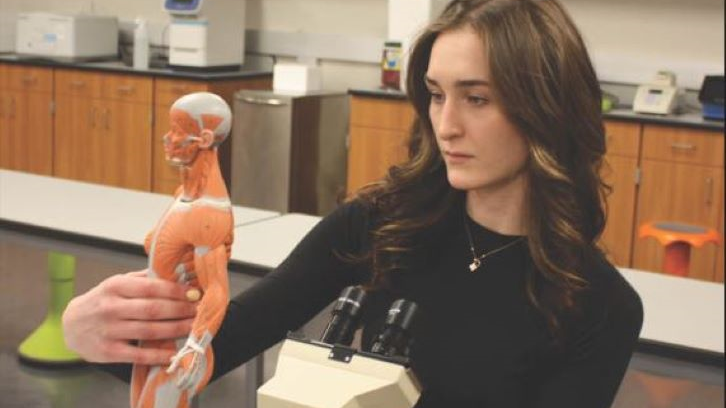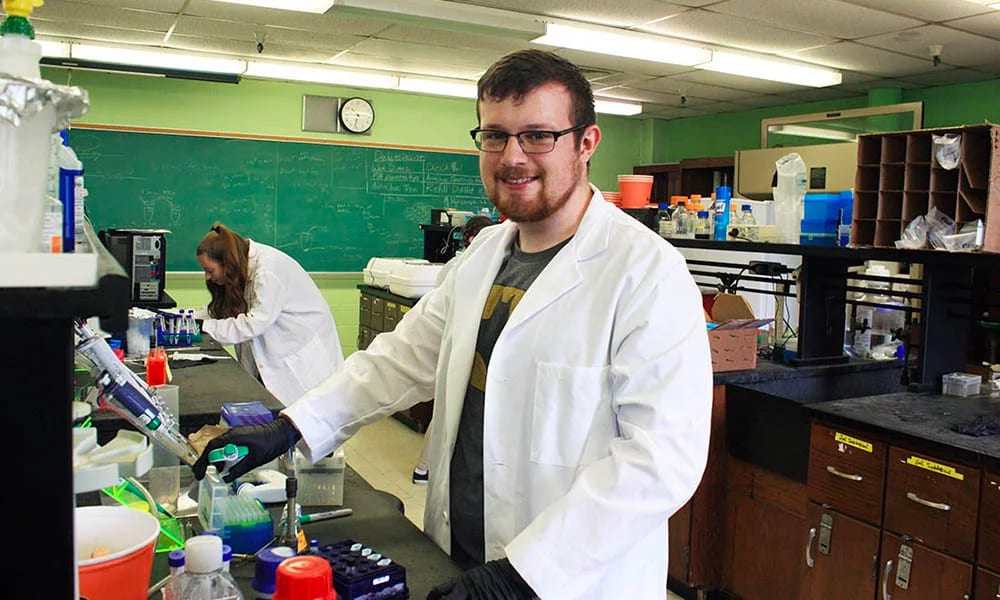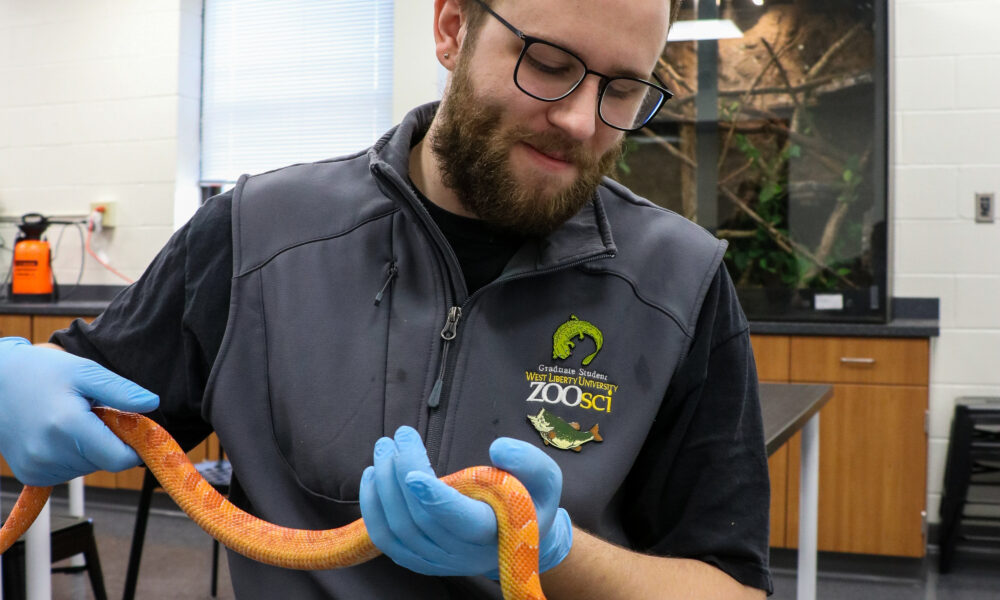Graduate Programs
Master of Science or Arts
in Biology
- Programs
- Doctor of Education
- MA in Art Therapy and Counseling
- MA in Clinical Psychology
- Master of Arts in Education
- Master of Business Administration
- Master of Arts or Science in Biology
- MS in Criminology
- Master of Science in Dental Hygiene
- Master of Science in Exercise Physiology
- Master of Science in Physician Assistant Studies
- Master of Science in Speech-Language Pathology
- Graduate Certificate in Zoo Science
- Graduate Certificate in Healthcare Management
- Resources
- Contact
- Visit
- Apply
Masters in Biology at WLU
The Master’s Programs for Biology Majors at West Liberty University is designed to offer a flexible curriculum that meets the needs of students locally, nationally, and internationally. Students will enhance their educational and employment opportunities in the biological sciences. Students who enroll in this program have the opportunity to work in a research lab from molecular biology to ecology. This program is a 30-credit hour in-seat program.

This accelerated Master’s Program will allow you to finish in one year and is a pathway to Medical School. This degree is perfect for students who want to pursue medical school but need to improve their credentials for admission. This Master’s can also help students get accepted into Dental School, Veterinary School, and Physician Assistant programs.

This master’s degree program provides graduate students with coursework in subject areas like General Biology, Microbiology, Ecology, Evolution, Human Biology, & Environmental Stewardship preparing them for professional school entrance or advancement in the workplace.

This online master’s degree program provides graduate students with the coursework in subjects that current zookeepers need to advance their careers in the zoo field.
Research Labs
Program Options Overview
The traditional MS in Biology is a 30 credit hour program. Students take 14 credit hours of graded biology coursework, the option for independent study, and a traditional thesis.
- Students must complete at least 30 hours of biology graduate coursework, including the thesis. A maximum of 9 credit hours may be earned for the thesis.
- Candidates for the MS degree must register for and participate in Graduate Seminar (seminar will be 1 credit hour per semester) each semester, except the thesis semester, while they are actively enrolled in the graduate program. No more than 3 credit hours of seminar may be used to complete the 30 credit hour requirement.
- Students must complete 14 credit hours in graded graduate biology courses including BIO510 Graduate Research Skills.
- Students may take up to 9 credit hours of “Independent Study” per semester. However, no more than 4 credit hours in “Independent Study” may be used to complete the 30 credit hour requirement. Moreover, these Independent Study credits may only be applied beyond the required 14 credit hours in graded biology graduate courses.
- Successful completion of the graduate program in biology requires a GPA of 3.0 or higher, and no more than 6 credit hours of “C” grades may be applied to the total hours for graduation. Upon completion of course requirements and the thesis, MS candidates must pass an oral thesis defense.
- Download the MS in Biology, Traditional Curriculum Guide.
The traditional MA in Biology provides a bridge program for students desiring coursework at the graduate level to prepare them for more competitive professional school entrance or for advancement in the workplace. Coursework in the traditional MA in Biology can be selected from a variety of dual-listed electives to allow focusing of study as needed. The use of dual-listed courses (upper-level courses in undergraduate biology offered with differentiated learning at the 500-level to graduate students) allows maximum efficiency in programming without any detriment to the undergraduate student population.
- Students who select the MA option must complete a minimum of 30 credit hours of graduate coursework. MA students must take Graduate Seminar (1 credit per semester) during each semester they are actively enrolled in the program. No more than 4 credit hours of the seminar may be used to complete the 30 MA in Biology credit hour requirement.
- MA students must complete a minimum of 26 credit hours of graded biology graduate coursework. No more than 6 credit hours of “C” grades may be applied to the total hours for graduation.
- MA candidates do not conduct thesis research.
- Successful completion of the graduate program in biology requires a GPA of 3.0 or higher and a comprehensive examination score of 75% or higher. Students may take the comprehensive examination a total of two times to achieve or surpass the minimum score.
- Download the MA in Biology, Tradition Curriculum Guide.
3+2 MS in Biology allows undergraduate students to be admitted as freshmen to the combined program; the accepted students will take a slightly heavier (17-18 credit hour) course load per semester for the first three years of study. From the standard undergraduate coursework, these students will be allowed to count 14 credit hours of dual-listed courses toward the bachelor’s and master’s degree enabling them to complete all undergraduate and graduate requirements, including thesis, in a 5-year timespan.
- Students must complete at least 30 hours of biology graduate coursework, including the thesis. A maximum of 9 credit hours may be earned for the thesis.
- Candidates for the MS degree must register for and participate in Graduate Seminar (seminar will be 1 credit hour per semester) each semester, except the thesis semester, while they are actively enrolled in the graduate program. No more than 3 credit hours of seminar may be used to complete the 30 credit hour requirement.
- Students must complete 14 credit hours in graded graduate biology courses including BIO510 Graduate Research Skills.
- Students may take up to 9 credit hours of “Independent Study” per semester. However, no more than 4 credit hours in “Independent Study” may be used to complete the 30 credit hour requirement. Moreover, these Independent Study credits may only be applied beyond the required 14 credit hours in graded biology graduate courses.
- Successful completion of the graduate program in biology requires a GPA of 3.0 or higher, and no more than 6 credit hours of “C” grades may be applied to the total hours for graduation. Upon completion of course requirements and the thesis, MS candidates must pass an oral thesis defense.
- Download the MS in Biology, 3 + 2 Curriculum Guide.
Your Future in Biology
The applied knowledge and experience gained through the MS in Biology will prepare students for continued education through Biology PhD program matriculation. Obtaining the MS in Biology will significantly increase the likelihood that a student will be accepted into, and successfully complete a quality PhD program.
Students who complete the MS in Biology from West Liberty University will be qualified to work as research technicians in many of the research intensive universities in the surrounding areas, such as the University of Pittsburgh and West Virginia University.
Over 30 job openings for positions involving biological research at the University of Pittsburgh that require a Master’s degree and 29 at The Ohio State University were identified. These openings indicate that in the local area, there is a substantial need for more individuals with graduate-level training in the biological sciences.
The education attained by completing the MA in Biology curriculum will substantially prepare students planning to enter professional programs such as medical school. These students will have shown that they are capable of completing graduate courses with the level of rigor associated with medical and other professional schools.
This will be especially helpful for students with identified academic challenges in the undergraduate background, as admission boards are more likely to accept these students when presented with evidence that they have had success beyond the undergraduate level.
Students who attain a Master’s degree in biology represent the preferred pool of applicants for a multitude of careers in the environmental sciences as well. State Departments of Natural Resources, Departments of Environmental Protection, Forestry Departments in addition to environmental non-profit organizations and private environmental consulting firms all prefer to hire applicants who have completed the requirements for a Master’s degree in biology over individuals lacking a graduate degree.
A job search conducted on 15 January 2016 on the Texas A&M Environmental Jobs Board found that nationally all full-time positions (n = 26) with both leadership roles and salaries above $40K/year required an MS in Biology or related fields. Federal employment in the U. S. Forest Service, U. S. Fish and Wildlife Service, and the Environmental Protection Agency is ceilinged for individuals lacking a graduate degree, and limited primarily to technician positions.
Acquisition of a Master’s degree enables access to higher paying positions that often deal with environmental policy, regulation, and major national decisions. Acquisition of a Master’s degree at WLU will enable our graduates to join this workforce.
Cost
To learn more about the cost of our programs, please visit the Business Office Webpage.
Cost of Attendance
Please Note: This is based on being enrolled in 12 credit hours for the year.
| 2023-2024 MA/MS BIOLOGY Financial Aid Cost of Attendance | In-State Off-Campus | In-State On Campus |
| Tuition & Fees | $7,140 | $7,140 |
| Food and Housing | $10,720 | $12,054 |
| Books & Supplies | $762 | $762 |
| Personal Expenses | $1,542 | $1,542 |
| Transportation Expenses | $3,193 | $2,448 |
| Federal Student Loan Fees | $2,889 | $2,889 |
| TOTAL | $26,246 | $26,835 |
| 2023-2024 MA/MS BIOLOGY Financial Aid Cost of Attendance | Out-of-State Off Campus | Out-of-State On Campus |
| Tuition & Fees | $8,340 | $8,340 |
| Food and Housing | $10,720 | $12,054 |
| Books & Supplies | $762 | $762 |
| Personal Expenses | $1,542 | $1,542 |
| Transportation Expenses | $3,193 | $2,448 |
| Federal Student Loan Fees | $2,889 | $2,889 |
| TOTAL | $27,446 | $28,035 |
For more information please visit the Business Office Website
Percent Change in Employment 2028
source: https://www.bls.gov/ooh/life-physical-and-social-science/biological-technicians.htm#tab-6
Employment of biological technicians is projected to grow 7% from 2018 to 2028, faster than the average for all occupations.
Greater demand for biological and medical research is expected to increase the need for these workers.
Source: https://www.bls.gov/ooh/life-physical-and-social-science/biological-technicians.htm%
Program Outcomes
Upon completion of the MS in Biology (MS Biology 3+2, MS Biology Traditional, MS Biology Zoo Science option), graduates will be able to:
- Demonstrate an in-depth mastery of field-specific advanced concepts in biological sciences and/or non-clinical biomedical sciences. [MSO1]
- Conduct research in a laboratory and/or field settings using appropriate basic equipment and discipline-specific techniques. [MSO2]
- Apply biometric principles to experimental design, and to the analysis and interpretation of data. [MSO3]
- Effectively communicate research and findings in a professional context (oral & written). [MSO4]
- Demonstrate independent scientific thinking. [MSO5]
- Design and implement an original research project. [MSO6]
- Effectively write papers suitable for publication and/or proposals suitable for funding. [MSO7]
Upon completion of the MA in Biology (Traditional and Zoo Science option), graduates will be able to:
- Demonstrate an in-depth mastery from a range of fundamental biological concepts and subjects, including cell biology, molecular biology, genetics, evolution and ecology, and principles of conservation biology. [MAO1]
- Critically review and analyze primary literature. [MAO2]
- Effectively communicate scientific ideas in both written and oral formats. [MAO3]
- Demonstrate independent scientific thinking. [MAO4]
Application Process
Instructions for Applying Through CAS
- 1. Click on the CAS system that corresponds with your graduate program.
- 2. Create a CAS account if you haven’t already.
- 3. Log into your CAS account.
- 4. Go to the Program Search section and search for West Liberty University.
- 5. Select West Liberty University and choose the specific graduate program you are applying to.
- 6. Follow the application instructions provided on the program’s main page within the CAS portal.
- 7. Important: All official transcripts must be submitted directly through CAS to complete your application.
For additional questions regarding the application process, please contact the Office of Graduate Studies at 304-336-8015.
Find out more about the MA/MS in Biology
Donate
Make a gift to the Graduate Studies Program by clicking here!
CONTACT US
MA/MS BIOLOGY
College of Sciences
West Liberty University
208 University Drive
West Liberty, WV 26074
304.336.8149
Toll Free: 866-WESTLIB ext. 8149
304.336.8266